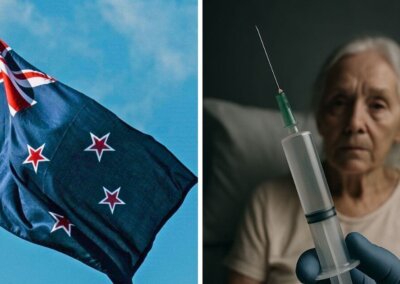As New Zealand’s euthanasia legislation comes into effect, anti-euthanasia campaigners have launched an initiative to begin the path towards repealing the legislation and protecting the vulnerable.
After becoming the first country in the world to introduce assisted suicide and euthanasia by popular vote in a binding referendum, New Zealand’s End of Life Choice Act (EOLCA) came into effect last Sunday. In response, DefendNZ has launched a new campaign to “protect” the vulnerable from the new law, and to “expose and improve” the law as it is written.
Their spokesperson, Henoch Kloosterboer, said: “Some may have wrongly assumed that this debate was over now that the EOLCA has come into force, when what this actually means is that our advocacy for the vulnerable put at risk by this law is more critical than ever before”.
He described the introduction of assisted suicide and euthanasia into New Zealand as “one of the most seismic shifts in law, healthcare and medical ethics in its entire history. As of this moment, some New Zealanders now wield the state-sanctioned legal power to deliberately end the lives of others, or to assist in their suicides”.
“To think that there will be no harms that will come from this is to be unaware of the many problems unfolding overseas in the limited number of places that have also legalised these practices – and this includes the harm of wrongful killings”.
He concluded: “We will protect patients, families and medical practitioners from the harms of the EOLCA. We will expose illegal practices and abuses of the vulnerable in order to ensure greater accountability. We will seek to improve this deficient law with amendments to the Act, lobbying the Government, and supporting those who truly care”.
On their website, DefendNZ states: “We have one common goal: to speak up about the implications that the End of Life Choice Act will have on society. To give voice to those who would be most affected by this Act and speak out about how it will impact families/whānau, the health system, legal system and the daily lives of those with terminal illness, the elderly and disabled”.
“#DefendNZ is here to protect, expose and improve”.
Polling suggests that 80% of those who voted in the assisted suicide referendum misunderstood what the law would actually do.
According to group Euthanasia-Free NZ “Polling during the advance voting period showed that 80% of New Zealand adults were misunderstanding what the End of Life Choice Act would legalise”.
“Only 20% of respondents knew that this Act would not make it legal to turn off machines that are keeping people alive”. [emphasis original]
Executive Officer of Euthanasia-Free NZ, Renée Joubert, said: “It seems that most New Zealanders voted for an end-of-life choice that is in fact already legal”.
Earlier this year, it was discovered that patients undergoing euthanasia in New Zealand will be given unapproved, unregulated and “off-label” drugs, raising concerns about the possibility of a prolonged and distressing death.
Right To Life UK spokesperson, Catherine Robinson, said: “The coming into effect of the assisted suicide and euthanasia legislation last Sunday will one day be recognised for the sad day it was. This change in law is indeed a ‘seismic shift’, which, under the guise of compassion, will directly target the elderly and the sick and vulnerable. The work of DefendNZ to begin the fight back against this legislation is especially crucial at this time”.












